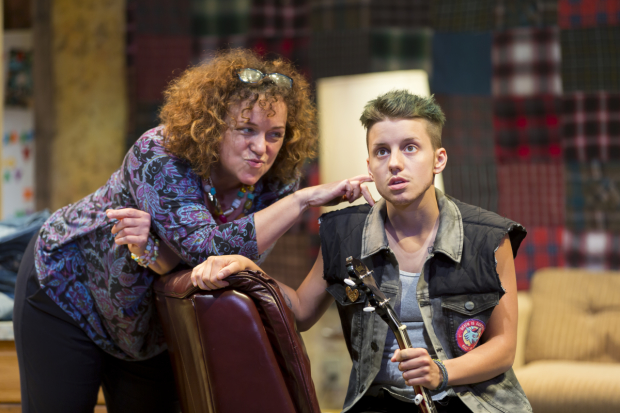
(© Scott Suchman)
Hir is a play about transition, demonstrated through the story of a family so dysfunctional that it eventually cracks apart. In a darkly funny production at the Woolly Mammoth Theatre Company, playwright Taylor Mac shows a quartet of humans in this chicken-and-egg play that dares the audience to choose what might be the cause of such agonizing effects. In Mac's view, years of paternalistic hierarchy and abuse were the cause; he then shows the subsequent anger and rebellion that became unfortunate effects leading to a third, wholly different level of chaos.
In Hir, the major characters are Paige, a formerly subservient wife and mother; her husband, Arnold, a plumber who used to beat his children; Isaac, who has been overseas with the Marines; and Max (formerly Maxine), a transgender teenager who is taking testosterone and has jettisoned the pronouns "his" or "her" for the pronoun "hir" (pronounced "here").
The play begins with Isaac's return home from the Marines. He walks into a house that looks as though it has been struck by a tornado: clothes lie everywhere, dirty dishes fill the sink, every inch of table and floor space is littered with paraphernalia, from stuffed animals to Hula-Hoops.
Arnold has had a stroke and cannot speak well. Paige rules the house with an iron fist, screaming rather than talking, refusing to cook or clean or impose any sort of domestic order. Paige's interest in art and culture has led her to dragging Max off to museums on Saturdays. And she insists that the family abandon all the old gender-specific pronouns (he/him/his) for the new non-binary pronouns (ze/hir/hirs). Paige and Max are not about to backtrack in their new explorations when Isaac comes home, dishonorably discharged for experimenting with drugs.
Emily Townley is appropriately overbearing and loud as Paige. Though the audience never witnesses it first hand, Townley does a fine job of describing the vicious husband who took his anger out on her and her boys, rather than the shuffling, mumbling man we now see before us.
Mitch Hébert is terrific as Arnold, kept subservient by his wife who puts estrogen in his daily shake to make sure that he remains manageable. It is a difficult role, as Arnold is humiliated by Paige at every turn, but Hébert handles it deftly and with humor.
Not surprisingly, Isaac tries to undo all the anarchy Paige has enforced, straightening the house, cooking meals, and allowing his father to watch television. Joseph J. Parks is excellent as Isaac, whose dream of being able to sleep in his own bed has been destroyed by Paige, who has given his room to Max. Parks is particularly effective when he explains his job in the Marines Mortuary Affairs Unit, preparing body parts to be sent Stateside. It is because of that job that Isaac understands how important the notion of home is for everybody, even a body that has been killed in war. Parks also gives Isaac several touching moments with Arnold and Max.
Malic White is equally fine as Max, who is waiting for the time "ze" can escape and live with "hir" friends as an anarchist. White plays Max as a person who realizes that hir anxieties may just be linked to being a teenager and not necessarily the result of choosing a gender-neutral lifestyle.
Director Shana Cooper keeps the pace of Hir moving swiftly, emphasizing its comic underpinnings. Set designer Misha Kachman creates a fabulously messy kitchen, dining room, and living room for Act 1, and the same space minus the mess for Act 2. Hir is set somewhere in California in no specific time, though it is grounded (thanks in part to costume designer Ivania Stack's middle-American street clothes) around the present day.
Hir is a profoundly unsettling play that offers a realistic representation of the disappearing American dream and the absurdity of one person attempting to control another. Mac's drama captures, with surreal precision, the unspeakable brutalities and unexpected kindnesses that exists in a country as severely divided – politically, sexually, and culturally – as America in 2017.









